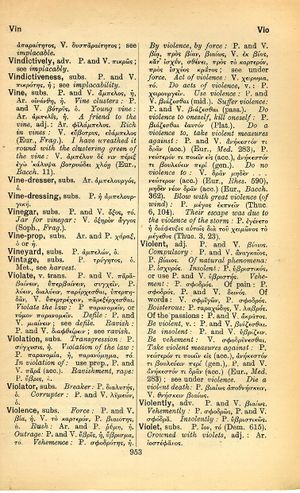violence: Difference between revisions
οἵ γε καὶ ἐν τῷ παρόντι ἀντιπάλως μᾶλλον ἢ ὑποδεεστέρως τῷ ναυτικῷ ἀνθώρμουν → whose navy, even as it was, faced the Athenian more as an equal than as an inferior
mNo edit summary |
m (Woodhouse1 replacement) |
||
| Line 1: | Line 1: | ||
{{Woodhouse1 | {{Woodhouse1 | ||
|Text=[[File:woodhouse_953.jpg|thumb|link={{filepath:woodhouse_953.jpg}}]] | |Text=[[File:woodhouse_953.jpg|thumb|link={{filepath:woodhouse_953.jpg}}]] | ||
===substantive=== | |||
[[force]]: P. and V. βία, ἡ. V. τὸ καρτερόν, P. [[βιαιότης]], ἡ. | [[force]]: [[prose|P.]] and [[verse|V.]] [[βία]], ἡ. [[verse|V.]] [[τὸ καρτερόν]], [[prose|P.]] [[βιαιότης]], ἡ. | ||
[[rush]]: Ar. and P. [[ῥύμη]], ἡ. | [[rush]]: [[Aristophanes|Ar.]] and [[prose|P.]] [[ῥύμη]], ἡ. | ||
[[outrage P.]] V. [[ὕβρις]], ἡ, [[ὕβρισμα]], τό. | [[outrage [[prose|P.]]]] [[verse|V.]] [[ὕβρις]], ἡ, [[ὕβρισμα]], τό. | ||
[[vehemence]]: P. [[σφοδρότης]], ἡ. | [[vehemence]]: [[prose|P.]] [[σφοδρότης]], ἡ. | ||
[[by violence]], [[by force]]: P. and V. βίᾳ, πρὸς βίαν, βιαίως, V. ἐκ βίας, | [[by violence]], [[by force]]: [[prose|P.]] and [[verse|V.]] [[βίᾳ]], [[πρὸς βίαν]], [[βιαίως]], [[verse|V.]] [[ἐκ βίας]], [[κατ' ἰσχύν]], [[σθένει]], [[πρὸς τὸ καρτερόν]], [[πρὸς ἰσχύος κράτος]]; see under [[force]]. | ||
[[act of violence]]: V. [[χείρωμα]], τό. | [[act of violence]]: [[verse|V.]] [[χείρωμα]], τό. | ||
[[do acts of violence]], v.: P. χειρουργεῖν. Use | [[do acts of violence]], v.: [[prose|P.]] [[χειρουργεῖν]]. Use | ||
[[violence]]: P. and V. βιάζεσθαι (mid.). | [[violence]]: [[prose|P.]] and [[verse|V.]] [[βιάζεσθαι]]; (mid.). | ||
[[suffer violence]]: P. and V. βιάζεσθαι (pass.). | [[suffer violence]]: [[prose|P.]] and [[verse|V.]] [[βιάζεσθαι]]; (pass.). | ||
[[do violence to oneself]], [[kill oneself]]: P. βιάζεσθαι ἑαυτόν ( | [[do violence to oneself]], [[kill oneself]]: [[prose|P.]] [[βιάζεσθαι ἑαυτόν]] ([[Plato]]). | ||
[[do a violence to]], [[take violent measures against]]: P. and V. ἀνήκεστόν τι δρᾶν (acc.) (Eur., ''Med.'' 283), P. νεώτερόν τι ποιεῖν εἰς (acc.), ἀνήκεστόν τι βουλεύειν [[περί]] (gen.). | [[do a violence to]], [[take violent measures against]]: [[prose|P.]] and [[verse|V.]] [[ἀνήκεστόν τι δρᾶν]] (acc.) ([[Euripides|Eur.]], ''Med.'' 283), [[prose|P.]] [[νεώτερόν τι ποιεῖν εἰς]] (acc.), [[ἀνήκεστόν τι βουλεύειν]] [[περί]] (gen.). | ||
[[do no violence to]]: V. δρᾶν | [[do no violence to]]: [[verse|V.]] [[δρᾶν μηδὲν… νεώτερον]] (acc.) ([[Euripides|Eur.]], ''[[Rhesus]]'' 590), [[μηδὲν νέον δρᾶν]] (acc.) ([[Euripides|Eur.]], ''[[Bacchae]]'' 362). | ||
[[blow with great violence]] ([[ | [[blow with great violence]] (of [[wind]]): [[prose|P.]] [[μέγας ἐκπνεῖν]] ([[Thucydides|Thuc.]] 6, 104). | ||
[[their escape was due to the violence of the storm]]: P. ἐγένετο ἡ | [[their escape was due to the violence of the storm]]: [[prose|P.]] [[ἐγένετο ἡ διάφευξις αὐτοῖς διὰ τοῦ χειμῶνος τὸ μέγεθος]] ([[Thucydides|Thuc.]] 3, 23). | ||
}} | }} | ||
Revision as of 09:15, 20 May 2020
English > Greek (Woodhouse)
substantive
force: P. and V. βία, ἡ. V. τὸ καρτερόν, P. βιαιότης, ἡ.
[[outrage P.]] V. ὕβρις, ἡ, ὕβρισμα, τό.
by violence, by force: P. and V. βίᾳ, πρὸς βίαν, βιαίως, V. ἐκ βίας, κατ' ἰσχύν, σθένει, πρὸς τὸ καρτερόν, πρὸς ἰσχύος κράτος; see under force.
act of violence: V. χείρωμα, τό.
do acts of violence, v.: P. χειρουργεῖν. Use
violence: P. and V. βιάζεσθαι; (mid.).
suffer violence: P. and V. βιάζεσθαι; (pass.).
do violence to oneself, kill oneself: P. βιάζεσθαι ἑαυτόν (Plato).
do a violence to, take violent measures against: P. and V. ἀνήκεστόν τι δρᾶν (acc.) (Eur., Med. 283), P. νεώτερόν τι ποιεῖν εἰς (acc.), ἀνήκεστόν τι βουλεύειν περί (gen.).
do no violence to: V. δρᾶν μηδὲν… νεώτερον (acc.) (Eur., Rhesus 590), μηδὲν νέον δρᾶν (acc.) (Eur., Bacchae 362).
blow with great violence (of wind): P. μέγας ἐκπνεῖν (Thuc. 6, 104).
their escape was due to the violence of the storm: P. ἐγένετο ἡ διάφευξις αὐτοῖς διὰ τοῦ χειμῶνος τὸ μέγεθος (Thuc. 3, 23).

